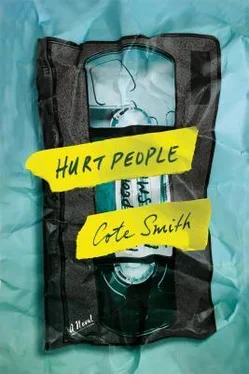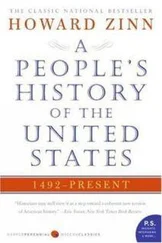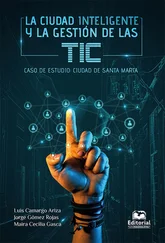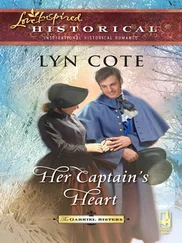“Don’t you get it?” my brother whispered. “Nobody’s watching. Rick’s gone. Mom’s working. Sandy and Cornbread are, well, you saw.” He smiled at me, though in a way I didn’t completely recognize. “We have the whole course to ourselves, dummy. We can do whatever we want.”
He got up and walked out the cafeteria’s side door, and I followed him outside, unsure what he meant. What could we do now that Rick was gone that we couldn’t do while Rick was here, except relax, not worry about his leg pinch?
We went around back, down the long hill that led to the golf cart garage. The air was thick and dead. Coming in from the daylight, I rubbed my eyes to help them adjust to the darkness, while keeping up with my brother as he weaved from row to row, snaked through the endless sea of carts.
“What are we doing?” I said.
“We’re doing what we always do,” my brother said.
“I don’t want to play hide-and-go-seek.”
“Who said anything about that?” he said, and started to walk faster, to take sharper and more surprising turns. I tried to track his feet, but he was running now, darting toward the back, where it was all dark.
I had to stop to catch my breath. “Wait up,” I said, but I could no longer hear my brother’s footsteps. “Where are you?” The entire garage was still, buzzing with silence. Everything looked like it could come to life. “I told you I’m not playing.”
I wound my way through several more rows. It got so dark that when I closed my eyes, there wasn’t much of a difference. “Come out! I don’t like this!”
No one returned my words. I sat down in the middle of a row and wondered what would happen if this was it. If I was a dead boy. I imagined my face on a flyer tacked to the bulletin board at my dad’s police station. The other officers would pat my dad on the shoulder, console him as he stared at my picture on his break, his face blank. They’ll find him, Alan would say. They always do. When they did find me, when I was discovered by Cornbread or, more likely, Rick, my mother would collapse over my body. Don’t touch him, she would say, running her hands through my hair, over my skin, which would be pale and pruney, like I had drowned in the pool. Don’t any of you touch him. And Rick would slowly back away, slinking back into the shadows, because he had never had a son and couldn’t know what to say. He would have to leave my mother alone.
I brought my legs to my chest and put my head down.
“Hey, c’mon,” a voice said. “What are you doing?”
I looked up and saw my brother.
“Get up, would you?” he said. “I want to show you something.”
* * *
“It’s a cart,” I said.
My brother had picked me up and walked me through rows of carts, leading me to what he wanted to show me. I held on to his shirt until we passed through what felt like the garage’s center, where it was lighter and any sound echoed. We took turns hooting and shouting, letting our voices disappear into the dark, only to return to us a second later, tinny, like we were talking through a can.
“Here it is,” he said, and sat down in a random cart, the last one in its row. I sat next to him in the passenger side, my butt on the edge so my feet could touch the floor.
“I don’t get it,” I said.
“Look.” He pointed at the ignition, where someone had left a key. “It’s Rick’s. This is his cart.” A green rabbit’s foot dangled from the key ring, bright and unreal. I remembered something similar dangling from Rick’s car keys. “Haven’t you ever noticed? He always leaves his keys in his cart, like an idiot. But now everybody’s gone. Now’s our chance.” I reached out to touch the rabbit’s foot, which I had been too afraid to do in Rick’s car. My brother slapped my hand away. “No way,” he said. “You’re too dumb to drive.” He took a deep breath, moved his hand to the shifter, and put the cart in reverse. “If anyone’s going to get us out of here, it’s going to be me.”
He twisted around so he could see what was behind him, and put his arm behind my neck, like our dad used to do to our mother when he drove our family around.
“Here we go,” he said, and put his foot to the pedal.
The cart jerked backward. Fast, out of control, its little motor roaring.
“Shit!” my brother yelled. He kicked at the brake, and just as sharply as we started, we stopped, slamming me back into my seat.
A bead of sweat dripped off my nose and into my mouth, salting my tongue. For a moment I sat there, taking in what had just happened. I glanced over at my brother, who had both hands on the wheel, staring at it like it was an alien ship. The ship had crash-landed thousands of years ago, and we were the stupid humans foolish enough to think we could make it fly.
“Maybe we should stop,” I said.
“We haven’t done anything. Not yet.”
I grabbed the rabbit’s foot, combed back its hair to find its skin. I reminded myself that Rick was gone. He wasn’t working today. And with him out of the picture, there was no one here to punish us.
“Are you sure?” I said.
“Yes,” my brother said. “Now’s our chance to get out of this dump.”
I scooted back in my seat. I took a breath, held on to the railing, and told my brother that I was ready. He put the cart in drive and inched us away from the wall. He drove slowly until the garage exit was in sight, like our mother did in school zones, even in the summer. But once we got out in the open, out of close quarters, he put his foot down hard and started to drive just like Rick.
* * *
We drove the cart all the routes Rick always went: up the hill to eighteen, down to five, across the rickety bridge to seven. Like Rick, and unlike any other driver I knew, when we started down a huge hill, instead of braking or letting the cart coast, my brother sped up. I grabbed the cart’s side rail because I didn’t have Rick’s arm to hold on to.
We circled a water hazard, murky with algae and pond scum. We stopped and found the biggest rock to throw in. I found a small, weird-shaped stone and put it in my pocket. A golf club pinged somewhere far off, and a white dot drifted into the blue sky. We watched the ball land in the tall ragweed surrounding the pond, and we laughed, because we knew the owner would never find it. Rick once said tall grass was where golf balls go to die.
“It’s nice not having to worry about Rick,” I said. “His stupid leg pinch.”
“We can go wherever we want,” my brother said. “That’s what’s nice.”
We got back in the cart and drove around some more. We drove all the places we could think to drive. I thought about the course map we made of all the places we explored — the one I spilled Kool-Aid on — how it took weeks to cover only a quarter of the course. If we had had the cart the whole time, we would have finished in one weekend. The whole thing seemed silly.
When we had gone everywhere else, my brother drove us to the abandoned scoreboard. The scoreboard stood to the side of where the eighteenth hole once was, back when eighteen was a par five. On one of our weekly rides, Rick explained that nobody could ever hit the ball far enough, so they moved the green and changed the hole to a four. Before that, the course was too tough, Rick said, especially for a city so short on talent.
We parked the cart behind a bush in case anyone showed up, though no one ever came out here but us. I raced my brother to the ladder, but when I looked back, he wasn’t racing at all. He was walking. He let me climb the ladder attached to the scoreboard’s back and took his time following. If you knew where to look, you could see the scoreboard from the cafeteria’s corner window. From that distance, it seemed small, a toy, a real-life thing made miniature for toddlers. But up close was different. The scoreboard towered above us, an abandoned fortress, our own secret skyscraper.
Читать дальше












